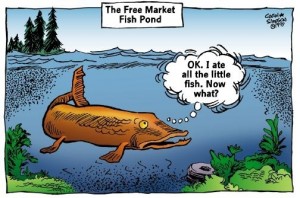The biggest laugh I received during my recent talk given in Quebec was when I characterized the operation of the U.S. health care system as no different than a Mexican drug syndicate or cartel. I relayed to the audience the idea that the dysfunction of the U.S. health care system is not due to any failure of the free market, but rather the almost complete absence of a free market.
Other than plastic surgery, Lasik surgery and what we are doing (joined by more and more physicians and facilities all the time) the free market is absent in healthcare in the U.S. This crony, corporatist, health cartel in the U.S. is aided and abetted and made possible by government at all levels, visible at all times, even here in Oklahoma. The most recent state legislative session here will be remembered for some time as an orgy of bribery by interested parties in the health care industry, working to protect their “turf.”
It is easy, however misguided, to confuse anyone seeking a profit, with a fan and proponent of free markets. While gangsters and bank robbers are seeking a profit, all would agree, I think that they are not the poster children of free markets. I believe this distinction was lost on a Canadian with whom I had lunch recently, an extremely bright individual who nonetheless attributed the failure of the U.S. healthcare system with the profit motive. It was, he claimed, simply not ethical to seek a profit in the course of delivering healthcare.
I asked this individual if the company for which he worked was profitable, a question to which he answered, “yes, quite.” I then asked him who gets to decide which enterprises are profitable and which ones are not and how this decision was made? During the drive from Montreal to Quebec my wife and I saw extremely large farming operations that were obviously profitable and I wondered how my new Canadian friend could tolerate a “for profit” motive in the food business, as the need for food is far anterior to health care.
I think many people equate the desire to make a profit with the desire to rip people off. While there are unscrupulous people everywhere, I would argue that the system of profits and losses (markets) provides the most powerful disciplinary medicine in exchanges between human beings, as those who are perceived as low value providers are simply avoided, their failure or bankruptcy the result. Furthermore, without profits and losses there is no way to determine whether a product or service is even necessary and no way to prioritize regarding the next best use of one’s limited resources. Without profits and losses you get the department of motor vehicles or the post office or the VA hospitals. Or you get the rationing of health care in a socialized medical economy.
I suppose I was seen as an enigma by my new Canadian friends, as charging 1/10th or less than what the big hospitals charge didn’t mesh with my unapologetic free market comments in their minds. True market competition as has been demonstrated countless times in all areas of the economy causes a general lowering of prices and an improvement in quality. While there is some semblance of a health care market in the U.S., this concept seemed completely foreign to the crowd in Quebec, a group that by and large believes that the government of Canada took over healthcare because it was the best thing for “the people.” The Canadians would do well to ponder one of my favorite quotes from the French philosopher Albert Camus: ”The welfare of the masses is always the alibi of tyrants.”
G. Keith Smith, M.D.
For more information about free market health care visit:
G. Keith Smith, M.D.


